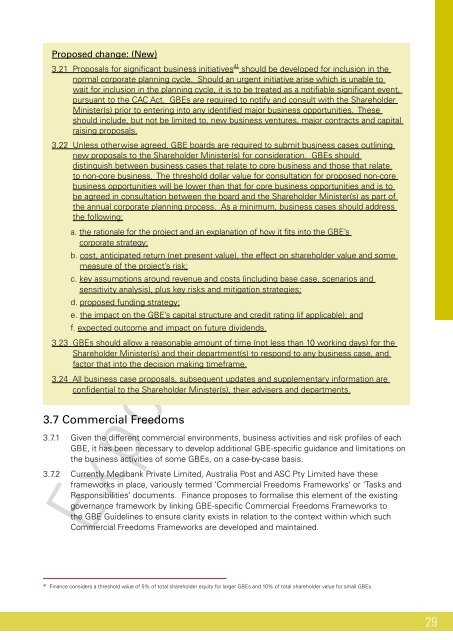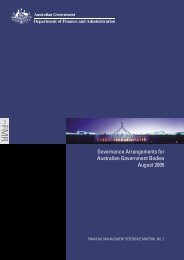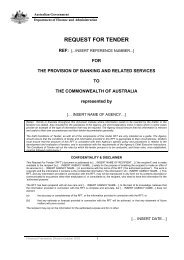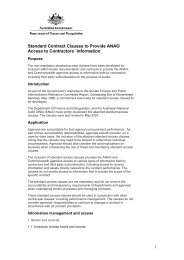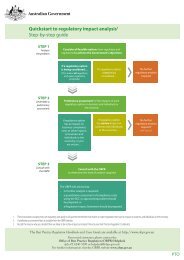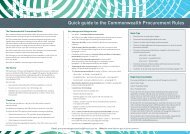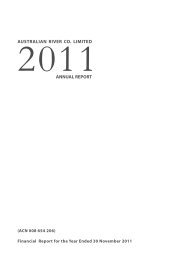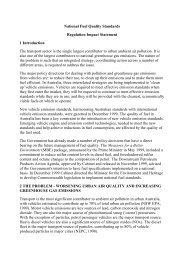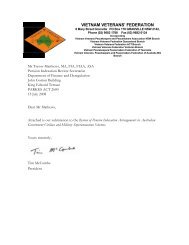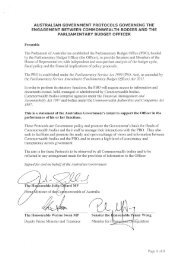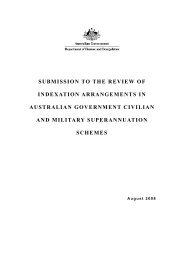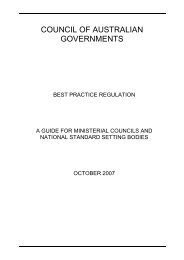Review of Commonwealth Government Business Enterprises ...
Review of Commonwealth Government Business Enterprises ...
Review of Commonwealth Government Business Enterprises ...
Create successful ePaper yourself
Turn your PDF publications into a flip-book with our unique Google optimized e-Paper software.
Proposed change: (New)<br />
3.21 Proposals for signifcant business initiatives 41 should be developed for inclusion in the<br />
normal corporate planning cycle. Should an urgent initiative arise which is unable to<br />
wait for inclusion in the planning cycle, it is to be treated as a notifable signifcant event,<br />
pursuant to the CAC Act. GBEs are required to notify and consult with the Shareholder<br />
Minister(s) prior to entering into any identifed major business opportunities. These<br />
should include, but not be limited to, new business ventures, major contracts and capital<br />
raising proposals.<br />
3.22 Unless otherwise agreed, GBE boards are required to submit business cases outlining<br />
new proposals to the Shareholder Minister(s) for consideration. GBEs should<br />
distinguish between business cases that relate to core business and those that relate<br />
to non-core business. The threshold dollar value for consultation for proposed non-core<br />
business opportunities will be lower than that for core business opportunities and is to<br />
be agreed in consultation between the board and the Shareholder Minister(s) as part <strong>of</strong><br />
the annual corporate planning process. As a minimum, business cases should address<br />
the following:<br />
a. the rationale for the project and an explanation <strong>of</strong> how it fts into the GBE’s<br />
corporate strategy;<br />
b. cost, anticipated return (net present value), the effect on shareholder value and some<br />
measure <strong>of</strong> the project’s risk;<br />
c. key assumptions around revenue and costs (including base case, scenarios and<br />
sensitivity analysis), plus key risks and mitigation strategies;<br />
d. proposed funding strategy;<br />
e. the impact on the GBE’s capital structure and credit rating (if applicable); and<br />
f. expected outcome and impact on future dividends.<br />
3.23 GBEs should allow a reasonable amount <strong>of</strong> time (not less than 10 working days) for the<br />
Shareholder Minister(s) and their department(s) to respond to any business case, and<br />
factor that into the decision making timeframe.<br />
3.24 All business case proposals, subsequent updates and supplementary information are<br />
confdential to the Shareholder Minister(s), their advisers and departments.<br />
3.7 Commercial Freedoms<br />
3.7.1 Given the different commercial environments, business activities and risk pr<strong>of</strong>les <strong>of</strong> each<br />
GBE, it has been necessary to develop additional GBE-specifc guidance and limitations on<br />
the business activities <strong>of</strong> some GBEs, on a case-by-case basis.<br />
3.7.2 Currently Medibank Private Limited, Australia Post and ASC Pty Limited have these<br />
frameworks in place, variously termed ‘Commercial Freedoms Frameworks’ or ‘Tasks and<br />
Responsibilities’ documents. Finance proposes to formalise this element <strong>of</strong> the existing<br />
governance framework by linking GBE-specifc Commercial Freedoms Frameworks to<br />
the GBE Guidelines to ensure clarity exists in relation to the context within which such<br />
Commercial Freedoms Frameworks are developed and maintained.<br />
Exposure Draft<br />
41 Finance considers a threshold value <strong>of</strong> 5% <strong>of</strong> total shareholder equity for larger GBEs and 10% <strong>of</strong> total shareholder value for small GBEs.<br />
29


